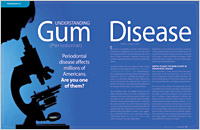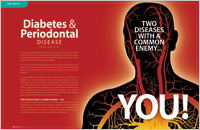What is Gum Disease?
Gum disease is an inflammation of the gums that can progress to affect the tissues and bone that surround and support your teeth. It is the major cause of about 70% of adult tooth loss, affecting nearly 80% of people at some point in their life. Gum disease includes gingivitis (the early stage of gum disease) and periodontitis (a more advanced stage of gum disease).
What Causes Gum Disease?
Gum Disease is caused by plaque, a soft, sticky film that builds up on your teeth and contains bacteria. You can remove plaque by brushing twice a day and cleaning between your teeth daily. Plaque that is not removed daily by brushing and flossing between teeth can eventually harden into tartar. Brushing and flossing become more difficult as tartar collects at the gum line. As the tartar, plaque and bacteria continue to increase, the gum tissue can become red, swollen and possibly bleed when you brush your teeth. This is called gingivitis, an early stage of gum (periodontal) disease. If left untreated, periodontal disease can damage the tissues that support your teeth, even the bone.
Signs & Symptoms of Gum Disease
Gums that easily bleed when brushing or flossing
Swollen, red or tender gums
Gums that seem to be pulling away from your teeth
Persistent bad breath
An unpleasant taste in your mouth
Teeth that are loose or are separating from each other
Sharp or dull pains when chewing foods
Teeth that are overly sensitive to cold or hot temperatures
Prevention
Daily brushing and flossing (morning and night) can help prevent periodontitis. So can regular visits to your dentist for professional cleanings. If you smoke, quitting will reduce your risk of this disease.
While you should always check for the warning signs of gum disease when you are brushing and flossing, be aware that there might not be any discomfort until the disease has reached an advanced stage. That’s why it’s important to visit your dentist regularly to have your teeth cleaned. Your dentist can monitor your oral health and help you identify and prevent problems before they become more serious.
Related Periodontal (Gum) Disease Articles
 The Link Between Heart & Gum Diseases
The Link Between Heart & Gum Diseases
Inflammation has emerged as a factor that is involved in the process of Cardiovascular Disease (CVD), which commonly results in heart attacks and strokes. While the precise role inflammation plays in causing chronic CVD remains an area of intense current investigation, much more is now known. The good news is that, based on current research, we know that if we can reduce the inflammation caused by periodontal disease, we can reduce the risk for heart attacks and strokes... Read Article
 Understanding Gum (Periodontal) Disease
Understanding Gum (Periodontal) Disease
Have your gums ever bled when you brushed or flossed? This most commonly overlooked simple sign may be the start of silent (periodontal) disease leading to tooth loss. Learn what you can do to prevent this problem and keep your teeth for life... Read Article
 Diabetes & Periodontal Disease
Diabetes & Periodontal Disease
Diabetes and periodontal disease are chronic inflammatory diseases that impact the health of millions of people. What you may not know is that diabetes and periodontal disease can adversely affect each other... Read Article
 Warning Signs of Periodontal (Gum) Disease
Warning Signs of Periodontal (Gum) Disease
This article provides the warning signs of periodontal (gum) disease. Don't wait until it's too late... Read Article


